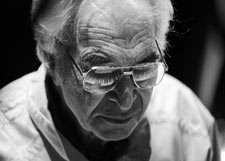 A column earlier this year on jazz and spirituality elicited a response from the office of piano legend Dave Brubeck.
A column earlier this year on jazz and spirituality elicited a response from the office of piano legend Dave Brubeck.
I had mentioned his 1973 cantata Truth Is Fallen, and subsequently received a large package of CDs and a DVD which made it abundantly clear Truth Is Fallen was hardly a onetime event. Brubeck has amassed a considerable catalogue of sacred works, and faith plays a crucial role in all his endeavors.
In the 1950s, Brubeck and his classic quartet were cerebral yet swinging. Taking tricky time signatures into the hit parade with trend setters like ‘Take Five’ and ‘Unsquare Dance,’ they made the brave new world that much more sophisticated.
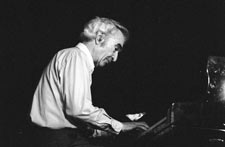
By the end of the 60s, he had disbanded the group in order to devote more time to symphonic works – the majority of which are sacred, and, not surprisingly, just as technically demanding as his earlier material.
While his initial fame came from jazz, he’s written choral masses (over 50 vocal works alone), orchestral pieces, ballet suites, string quartets, and even a musical. Only a fraction of his liturgical work has been recorded.
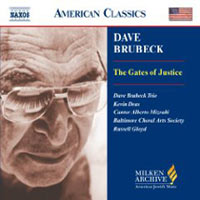 Brubeck’s first major classical work, The Light In the Wilderness: An Oratorio For Today premiered in 1968, and focused on the gospel story. The following year brought The Gates of Justice, a cantata composed after the assassination of Martin Luther King.
Brubeck’s first major classical work, The Light In the Wilderness: An Oratorio For Today premiered in 1968, and focused on the gospel story. The following year brought The Gates of Justice, a cantata composed after the assassination of Martin Luther King.
A series of anti-Semitic incidents had occurred the same year, and Gates was in part a call for unity – for African-Americans and Jews to appreciate their shared histories of enslavement and suffering, and come together in the spirit of brotherhood.
Researching the piece, Brubeck said he was surprised at how similar the Hebraic chant is to black spirituals and blues music.
In addition to quotes from King and Hebraic scripture, lyrics were written by Iola, Brubeck’s wife and long-time collaborator. The couple, who have six children, recently celebrated their 65th wedding anniversary.
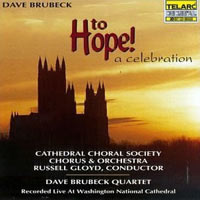 Perhaps his most popular major work, To Hope! A Celebration is a Mass in the Revised Roman Ritual. Debuting in 1980, it has gone on to be performed across the globe. A 1995 performance from the Washington National Cathedral – which Brubeck describes as being one of the most memorable moments of his life – was issued by Telarc.
Perhaps his most popular major work, To Hope! A Celebration is a Mass in the Revised Roman Ritual. Debuting in 1980, it has gone on to be performed across the globe. A 1995 performance from the Washington National Cathedral – which Brubeck describes as being one of the most memorable moments of his life – was issued by Telarc.
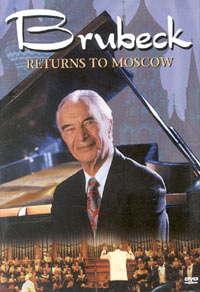 The DVD Brubeck Returns To Moscow documents a Russian performance of To Hope!, and includes a fascinating interview. Queried as to whether the piece implied he was a Roman Catholic, he responds: “I wasn’t when I wrote it – and after I finished it, I joined.” Brubeck was raised in the Presbyterian Church – but, he laughs, “they forgot to baptize me!”
The DVD Brubeck Returns To Moscow documents a Russian performance of To Hope!, and includes a fascinating interview. Queried as to whether the piece implied he was a Roman Catholic, he responds: “I wasn’t when I wrote it – and after I finished it, I joined.” Brubeck was raised in the Presbyterian Church – but, he laughs, “they forgot to baptize me!”
Vocals dominate Brubeck In Chattanooga. Some pieces are entirely accapella, while others offer minimal accompaniment.
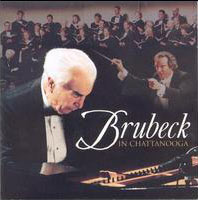 Opening with a fascinating, polytonal vocal arrangement of the Christmas classic ‘We Three Kings,’ the disc includes the world premiere of ‘Yes We Have Our Cross To Bear,’ both as a chorale and a swing version; and a choral treatment of ‘Regret’ – with the title sung repeatedly, producing an haunting, almost spellbinding effect.
Opening with a fascinating, polytonal vocal arrangement of the Christmas classic ‘We Three Kings,’ the disc includes the world premiere of ‘Yes We Have Our Cross To Bear,’ both as a chorale and a swing version; and a choral treatment of ‘Regret’ – with the title sung repeatedly, producing an haunting, almost spellbinding effect.
The disc is available exclusively through Choral Arts Of Chattanooga.
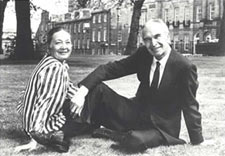
There’s much, much more, including: recent efforts like The Commandments, a six minute choral work; his Easter Oratorio ‘Beloved Son,’ the Pentecost Oratorio ‘The Voice of the Holy Spirit;’ and ‘Upon This Rock,’ which Brubeck premiered personally for Pope John Paul II during his American visit in 1987.
Despite his advanced age, there’s no hint of slowing down. Brubeck turns 88 years old this month, but he’s as busy as ever – composing new works and touring the world with his quartet. Here’s to many more years from one of American greatest musical treasures.
- Dave Brubeck: Brubeck In Chattanooga [Choral Arts of Chattanooga 2002]
- Brubeck: The Gates Of Justice Dave Brubeck Trio, Kevin Deas, Tom Hall, Alberto Mizrahi; Russell Gloyd, Baltimore Choral Arts Society, [Milken Archive]
- Brubeck: To Hope! A Celebration (A Mass In The Revised Roman Ritual), [Telarc]
- Dave Brubeck Returns to Moscow, [DWP]
© John Cody 2005
